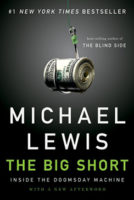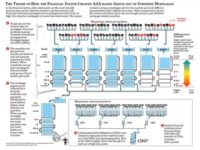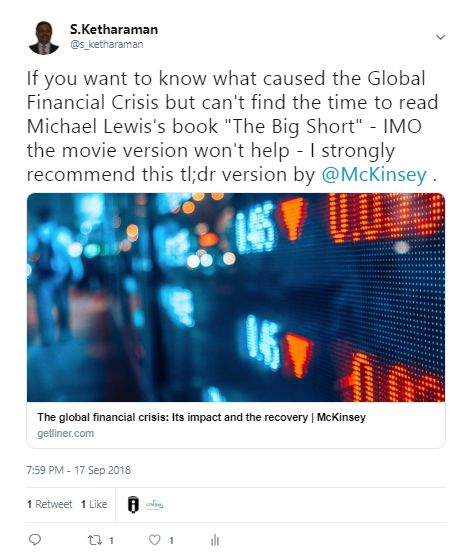what caused the crash of the housing market should some went to jail
On the 10th anniversary of the bankruptcy of Lehman Brothers, the media is total of articles questioning why nobody went to jail for the Great Financial Crisis that followed. Take, for instance, A crisis nobody went to jail for.

Co-ordinate to nigh of these articles, the GFC happened beause of greed, laziness, cronyism and adulterous past banks.
We tin straight away toss out greed, laziness and cronyism – they're non crimes.
While cheating is a criminal offense, banks and financial institutions are arguably not guilty of this accuse.
Co-ordinate to Michael Lewis's bestseller "The Large Short" and many other accounts of the GFC, this is what happened:
Mortgage originators wrote dwelling house loans to Americans eager to achieve the "American Dream" of abode buying, FIs packaged the mortgages into Mortgage Backed Security and sold it to other FIs, who packaged MBS into Collateralized Debt Obligation and sold it to some other FIs, who packaged CDOs into CDO-square, and … .
On and on it went and loans were packaged into more than and more fancy structured fiscal products and sold past one financial institution to another. It was product innovation at its best.
Borrowers were happy because they could purchase bigger houses. FIs were happy because they earned fat fee income at every phase. Business was booming.

(CLICKHERE TO Expand)
According to the popular narrative, financial institutions hid the toxic nature of their assets. Simply that's simply not true. Instead they disclosed the exact composition of their structured financial products to Credit Rating Agencies. They needed to exercise this in order to get their products rates, which was a a prerequisite for selling them to other financial institutions. If annihilation, banks revealed too much, not too piddling. CRAs gave these products AAA or AA ratings, probably because they missed what Malcom Gladwell called "the sleazy stuff in footnote 42" of the applications forms they received from banks.
In hindsight, these products deserved junk-course ratings. But, at the time, buyers had every incentive to take the AAA and AA ratings at face up value considering they could repackage whatever they bought into another product and sell it along to the next guy in the chain. Information technology was similar a game of "passing the parcel" – nobody stops to inspect what's in the parcel lest the music stop when they're still property the parcel. In other words, no one wanted to be defenseless holding the package when the music inevitably stopped.
Information technology was only when overextended borrowers (9% of the total) started missing their repayments years subsequently that these originally-pristine products started turning toxic.
Banks might accept exhibited a blithe attitude, just that's non a crime. (Apparently some banks colluded with valuation agencies to inflate the toll of homes. That's a civic - not criminal - offence and many banks did get fined for that. More than on that in a bit).

(https://twitter.com/s_ketharaman/status/1041695543930564609)
While CRAs were guilty of incompetence in giving high ratings to these products, incompetence is not a crime, either. Information technology'due south besides peradventure a testimony to the intrinisic complexity of the job of rating that the same CRAs enjoy 94% share of the ratings market place ten years later.
While all this was happening, a few finance industry honchos like Dr. Michael Coffin and Steve Eisman pored over the same prospectuses and spotted the toxic ingredients in the MBSs, CDOs and CDO2s. They rightly predicted that the music would finish imminently and shorted the subprime mortgage market. When their bets proved correct, they made a killing.
-----
As for chances of a similar crisis happening in future, Wall Street banks just launched fifty-fifty fancier synthetic products based on Bitcoin. There's notwithstanding no law to terminate them from packaging these products and selling them to one another the way they did last time. So the powder keg is already in identify.
What'due south missing is the spark. Probably in the interest of political correctness, the media conveniently ignores the part of the consumer in the last GFC. It was the consumer who borrowed more than his or her ability to repay (which is also not a crime). It was the consumer's default in repayments that set up off the whole chain of events that eventually precipitated the terminal crisis.
Unless the common man takes greater responsibleness for their financial deportment, I'yard afraid, sparks will wing before long.
I'thousand not alone. Fortune predicts the same in its recent comprehend story entitled The End is Near. In some other piece titled How to Spot the Next Financial Crisis, the magazine observes, "The main causes of the last crunch—human self-delusion and irrationality—will be the main causes of the side by side one. If that seems unbearably depressing, cheer upward: It tells u.s.a. what to sentinel out for."
The final crisis was undergirded by concrete assets in the form of homes. The adjacent one, if and when information technology happens, will accept 1s and 0s floating effectually in cyberspace.

-----
Contrary to the popular narrative, one person actually went to jail for GFC: Kareem Serageldin, quondam Managing Managing director / Global Head of Structured Credit in the Investment Banking Partition of Credit Suisse Grouping. Co-ordinate to Wikipedia, Serageldin "was sentenced to 30 months in prison house in connection with a scheme to hibernate more than than $100 one thousand thousand in losses in a mortgage-backed securities trading book at Credit Suisse."
Just, since he was a midlevel functionary in a tier two financial institution, yous might nevertheless think the industry got away lightly.
That's not entirely truthful. According to Wall Street Journal, the vi largest US banks have paid at to the lowest degree $110 billion in penalties related to the crisis.
Then they didn't get abroad scot-gratuitous, after all.
furphydianstand1949.blogspot.com
Source: https://www.finextra.com/blogposting/16386/why-nobody-went-to-jail-for-the-great-financial-crisis